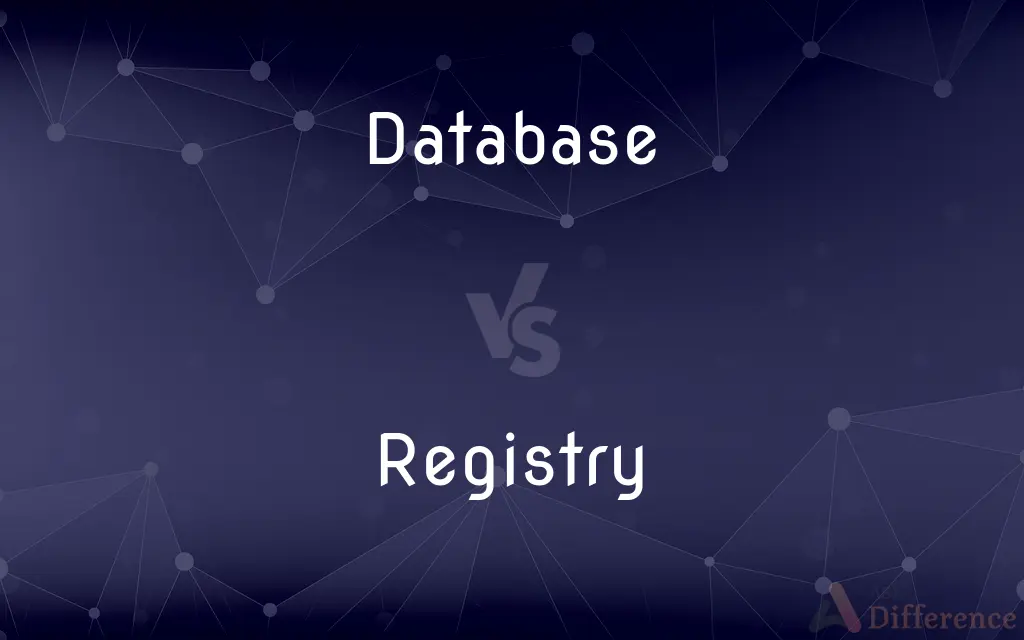Database vs. Registry — What's the Difference?
By Tayyaba Rehman — Updated on October 26, 2023
A database is a structured electronic storage system for data, while a registry is a system designed to record and manage specific information.

Difference Between Database and Registry
Table of Contents
ADVERTISEMENT
Key Differences
A database is an organized collection of data, typically stored and accessed electronically from a computer system. Databases allow for the storage, retrieval, and management of large amounts of information. A registry, on the other hand, is a specific type of database often used in operating systems to store configuration settings. While databases are diverse and can be used in various applications, registries are generally specialized and used for particular purposes, such as storing system settings.
Databases are designed for managing large volumes of data. They support complex querying, transaction processing, and data analysis. Registries, however, are not meant for handling high-volume transactions. Instead, they are optimized for quick access to configuration settings, often in a hierarchical structure. Databases can be relational or non-relational, whereas registries typically have a defined structure suitable for their specific use case.
The usage of databases is widespread in various industries for applications like customer data management, financial records, and academic research. Registries, in contrast, are primarily found in computing environments, for instance, the Windows Registry in Microsoft Windows operating systems. This reflects the specialized nature of registries compared to the more versatile applications of databases.
Security in databases is paramount, often involving multiple layers of protection due to the sensitivity of data they contain. In contrast, while registries also require security measures, the focus is often on ensuring stability and preventing unauthorized changes that could affect system performance. The database offers tools and features for comprehensive data management, while the registry provides a streamlined interface for system settings.
In terms of scalability, databases are designed to grow with the needs of an organization, handling an increasing amount of data and users. Registries, however, are typically not scaled in the same way, as they are bound to the constraints of the operating system or application they support. The design and purpose of databases allow for expansion and adaptation, whereas registries serve a more static role.
ADVERTISEMENT
Comparison Chart
Purpose
Stores and manages a wide variety of data.
Stores configuration settings and system information.
Usage
Used in various industries and applications.
Primarily used in computing environments.
Structure
Can be relational or non-relational, flexible.
Often hierarchical, specialized structure.
Scalability
Designed to handle growth in data and users.
Generally static, bound to system constraints.
Security Focus
Emphasizes protecting sensitive data.
Focuses on system stability and preventing unauthorized changes.
Compare with Definitions
Database
A database is an electronic system that allows data storage, retrieval, and management.
Researchers use a database to store and analyze scientific data.
Registry
A registry is a system for recording and maintaining specific data.
The national vehicle registry keeps track of all registered cars.
Database
A database is a structured set of data held in a computer.
The hospital's database contains confidential patient records.
Registry
A registry is an authoritative list or record.
The endangered species registry helps in conservation efforts.
Database
A database is a digital repository for storing and organizing information.
The company uses a customer database to track orders and preferences.
Registry
A registry is a database used for storing configuration settings.
The Windows Registry contains settings for the operating system.
Database
A database is a collection of information organized for easy access and management.
The real estate agent relied on the property database for market trends.
Registry
A registry is an official record-keeping system.
The hotel maintains a guest registry for all its visitors.
Database
A database is a systematic collection of data.
The library's database contains records of all the books and journals.
Registry
The act of registering; registration.
Database
A software program (application) for storing, retrieving and manipulating such a structured data set.
Which database do you use: MySQL or Oracle?
Registry
The registered nationality of a ship.
Database
In computing, a database is an organized collection of data stored and accessed electronically from a computer system. Where databases are more complex they are often developed using formal design and modeling techniques.
Registry
A place for registering.
Database
A collection of data arranged for ease and speed of search and retrieval. Also called data bank.
Registry
A book for official records.
Database
To put (data) into a database.
Registry
The place where such records are kept.
Database
(general) A collection of (usually) organized information in a regular structure, usually but not necessarily in a machine-readable format accessible by a computer.
I have a database of all my contacts in my personal organizer.
Registry
A building in which things are registered or where registers are kept.
Database
(computing) A set of tables and other objects (queries, reports, forms) in the form of a structured data set.
The "books" database will have three tables, and the "customers" database will have two tables.
Registry
A record; an account; a register.
Database
A combination of such data sets and the programs for using them.
Registry
The act of registering; registration.
Database
To enter data into a database.
Registry
(computing) A database of configuration settings etc. maintained by the Microsoft Windows operating system.
Database
An organized body of related information.
Registry
The act of recording or writing in a register; enrollment; registration.
Database
An organized body of related information
Registry
The place where a register is kept.
Registry
A record; an account; a register.
Registry
An official written record of names or events or transactions
Registry
A registry is a collection of information, typically for official purposes.
The marriage registry holds records of all legal marriages in the city.
Common Curiosities
Can a registry be considered a database?
Yes, a registry is a specialized type of database for certain types of data, such as configuration settings.
What are common uses of databases?
Databases are commonly used for storing customer data, financial records, and managing various types of information.
Can databases handle high-volume transactions?
Yes, databases are designed to handle high-volume transactions and complex querying.
What is a database?
A database is an organized collection of data stored electronically, often in a computer system.
Where are registries commonly found?
Registries are commonly found in computing environments, like the Windows Registry in operating systems.
What industries use databases extensively?
Industries like finance, healthcare, and technology extensively use databases.
How is data organized in a database?
Data in a database is organized systematically, often in tables or schemas.
What is a registry?
A registry is a system for recording and maintaining specific data, often related to system settings.
Is a registry typically scalable?
No, registries are generally not scalable like databases and are bound to system constraints.
What is the primary focus of security in databases?
The primary focus in databases is protecting sensitive data and ensuring data integrity.
What type of structure does a registry have?
A registry typically has a hierarchical structure, especially those used in operating systems.
Are databases flexible in structure?
Yes, databases can have flexible structures, being either relational or non-relational.
What is the security focus in registries?
In registries, the focus is on system stability and preventing unauthorized changes.
Are registries used for high-volume transactions?
No, registries are not meant for high-volume transactions but for quick access to specific settings.
Is a registry an official record?
Yes, a registry can be an official record, like a birth registry or vehicle registry.
Share Your Discovery

Previous Comparison
Mouth vs. Lip
Next Comparison
Traction vs. TensionAuthor Spotlight
Written by
Tayyaba RehmanTayyaba Rehman is a distinguished writer, currently serving as a primary contributor to askdifference.com. As a researcher in semantics and etymology, Tayyaba's passion for the complexity of languages and their distinctions has found a perfect home on the platform. Tayyaba delves into the intricacies of language, distinguishing between commonly confused words and phrases, thereby providing clarity for readers worldwide.
















































